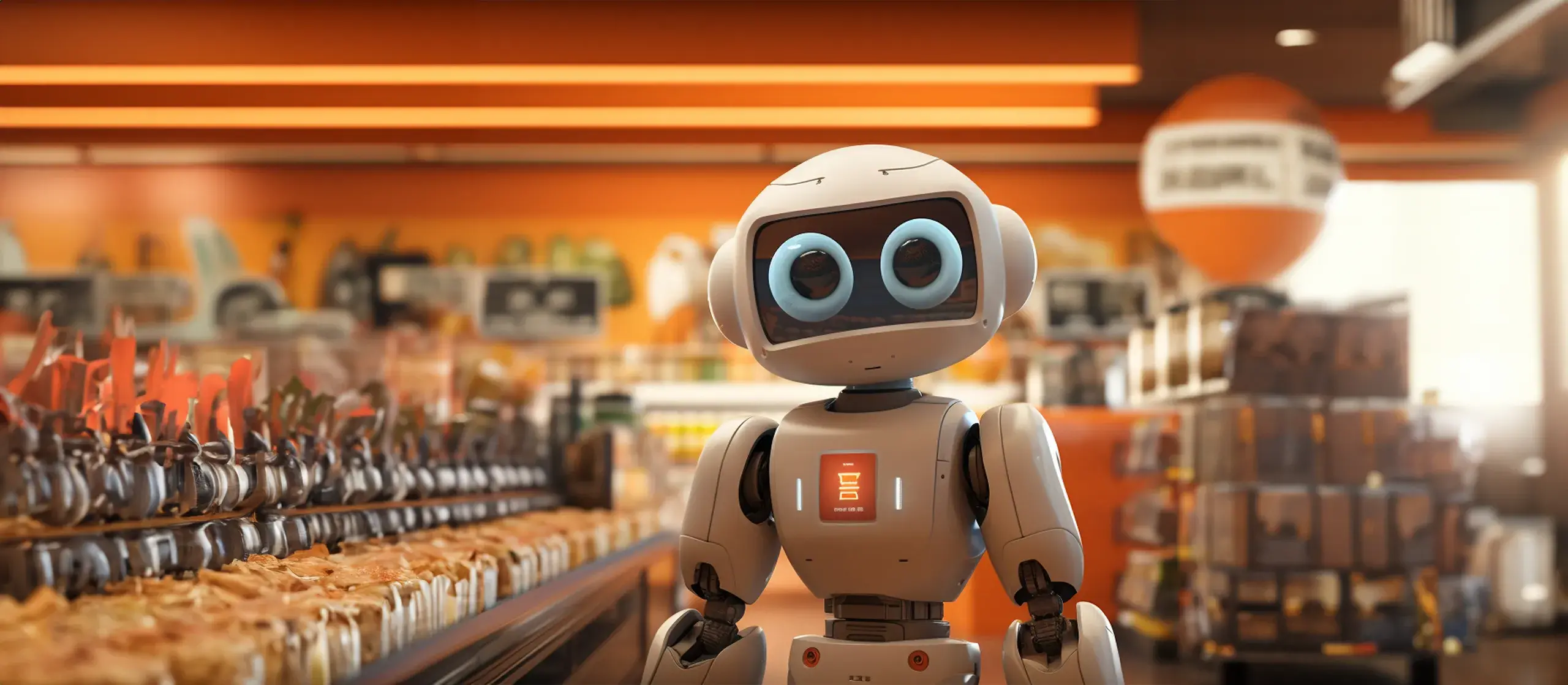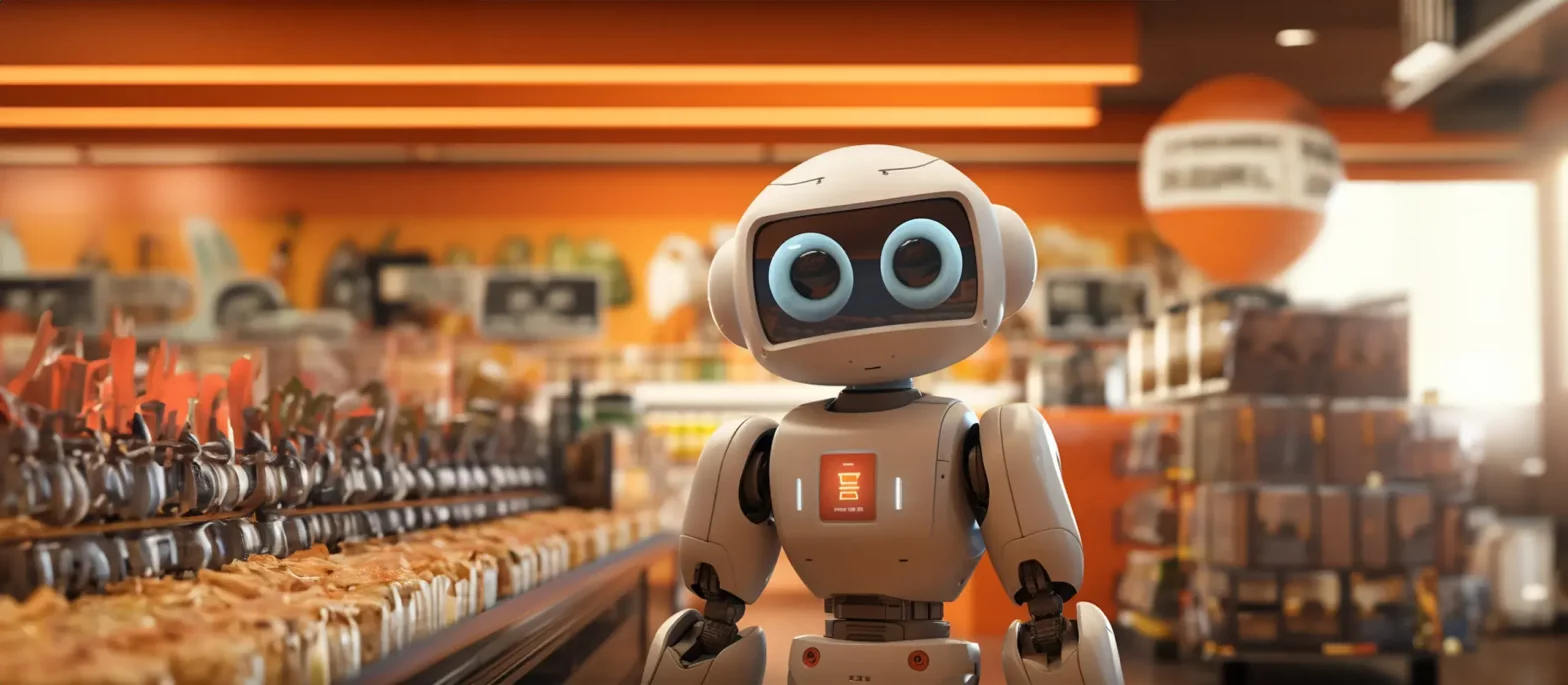- Use Cases
- April 30, 2024
AI in the Retail Industry (Use Cases & Real-World Examples)

- Use Cases
- April 30, 2024
AI in the Retail Industry (Use Cases & Real-World Examples)
The retail industry, once a brick-and-mortar haven for browsing and impulse buys, is undergoing a seismic shift. Consumers, empowered by technology, expect a personalized shopping journey, blurring the lines between online and physical experiences. Artificial intelligence (AI) is at the forefront of this transformation, enabling retailers to not only meet these evolving expectations but also unlock new avenues for growth and profitability.
Few AI Use Cases in the Retail Industry
-
- Recommendation Engines – AI can personalize recommendations across all channels, from in-store displays to targeted online ads, steering customers towards relevant products and increasing the likelihood of a purchase.
- Chatbots and Virtual Assistants – Imagine a virtual shopping assistant that can answer product inquiries, guide customers through the checkout process, or even recommend outfits based on style preferences. AI-powered chatbots can provide 24/7 customer support, addressing immediate needs and enhancing overall brand perception.
- Demand Forecasting – Using AI, retailers can analyze historical sales data, market trends, customer buying patterns, weather trends, and more to forecast future demands precisely. This allows retailers to streamline and optimize their inventory management approaches, reduce stockouts, and minimize the risk of excess inventory that requires heavy discounts.
- Automated Replenishment: Retailers can breathe easy with AI helping them monitor and manage inventory levels in real-time. Automated triggers can be applied for stock replenishment as inventory levels for popular products reach a low point, thereby minimizing lost sales opportunities.
The Ripple Effect: How AI Benefits Retailers and Customers
The benefits of AI in retail extend far beyond novelty. Here’s how both retailers and customers are reaping the rewards:
For Retailers:
- Enhanced Efficiency: AI automates routine tasks like inventory management and customer service inquiries, freeing up staff for more strategic initiatives.
- Data-Driven Decisions: AI analyzes vast amounts of customer data, providing insights into buying habits and preferences. This allows retailers to tailor product offerings, promotions, and store layouts for maximum impact.
- Personalized Experiences: AI can personalize product recommendations, targeted marketing campaigns, and loyalty programs, fostering deeper customer relationships.
For Customers:
-
-
- Convenience: From cashier-less stores to voice-activated ordering, AI streamlines the shopping experience, saving customers time and effort.
- Improved Product Discovery: AI personalizes product recommendations based on past purchases and browsing history, helping customers discover products they might genuinely enjoy.
- Enhanced Customer Service: AI-powered chatbots provide 24/7 customer support, addressing inquiries and resolving concerns quickly.
-
Real-World Examples of AI in Retail
-
-
-
- Amazon Go: This cashier-less store utilizes a sophisticated network of cameras and sensors to track customer purchases, eliminating checkout lines and friction from the shopping experience.
- Walmart’s Smart Shelves: These AI-powered shelves monitor inventory levels in real-time, alerting staff to restocking needs and preventing stockouts. This optimizes inventory management and ensures customer satisfaction.
- Sephora’s Virtual Artist: This AI-powered app allows customers to virtually try on makeup using their phone’s camera. This personalized experience not only increases product engagement but also helps customers find the perfect shade.
- Nike: Utilizes AI-powered chatbots to answer customer queries 24/7, improving customer service accessibility.
- Nordstrom: Deployed AI-powered chatbots named “Nordstrom Stylists” that answer customer questions, recommend products based on preferences, and even schedule appointments with human stylists.
- Macy’s – Utilizes AI to automate the replenishment process for its omnichannel operations. This streamlines order fulfillment, reduces manual labor costs, and improves overall operational efficiency.
-
-
Looking Forward: The Evolving Landscape of AI in Retail
The future of AI in retail promises even more groundbreaking advancements. We can expect to see:
-
-
-
-
- Predictive Analytics: AI will anticipate customer needs by predicting future trends and product demands, allowing retailers to optimize inventory and marketing strategies.
- Hyper-Personalization: AI will create truly individualized shopping experiences, tailoring product recommendations, store layouts, and promotions to each customer’s unique preferences.
- Augmented Reality (AR) Integrations: AR technology will allow customers to virtually experience products in their homes before purchase, increasing confidence and satisfaction.
-
-
-
The Human Touch Still Matters:
While AI is undeniably transforming the retail landscape, it’s important to remember that human interaction remains a crucial aspect of retail success. The ideal scenario is not a complete takeover by machines, but a harmonious collaboration between AI and human expertise. For example, AI can handle routine tasks like product recommendations, freeing up staff to provide personalized advice and build relationships with customers.
Conclusion
AI is no longer a futuristic concept in the retail industry. It’s here, and it’s fundamentally changing the way customers shop and interact with brands. By embracing AI and its capabilities, retailers can create a more personalized, efficient, and ultimately more satisfying shopping experience for their customers. The future of retail is not just about human or machine, but about a powerful partnership that leverages the strengths of both to create a winning formula.




